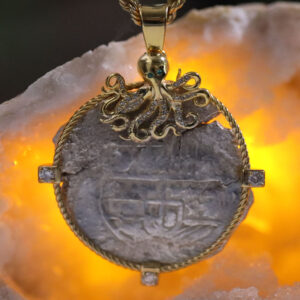Shipwrecks, shrouded in mystery, often carry tales of cursed treasures. Stories of ocean-seated voyages and haunted loot have surfaced from the ocean’s depths, captivating the imagination. But is there truth to these legends, or are they mere myths?
Here, you can explore the enigmatic allure of shipwreck treasures and the supposed curses they bear.
Historical Shipwrecks and Their Treasures
Throughout history, the ocean floor has become the final resting place for countless ships. Some of which carried treasures beyond measure. These shipwrecks, often discovered after centuries, continue to intrigue us with their stories and the myths of curses that surround them. Here are some historical shipwrecks.
- The Spanish galleon Nuestra Señora de Atocha is one of the most famous shipwrecks. It was sunk in 1622 off the coast of Florida and was laden with gold, silver, and precious gems from the New World. The Atocha was founded in 1985, and its treasure was valued at around $400 million. Legal battles and tales of misfortune followed the ship’s discovery, leading some to believe the treasure was cursed.
- Another notable wreck is the Whydah Gally, a pirate ship that sank off the coast of Cape Cod in 1717. The Whydah was the first authenticated pirate shipwreck in U.S. waters. Its captain, “Lack Sam” “Bellamy, cursed the treasure before his untimely death in the wreck. The curse supposedly brings misfortune to those who possess the ship’s treasures.
- The SS Central America, also known as the “hip of Gold,” “sank in a hurricane in 1857 carrying gold from the California Gold Rush. Its loss contributed to the financial panic of 1857. Found in 1988, the recovered gold was worth an estimated $150 million. The curse narrative here stems from the disaster’s timing, which exacerbated the economic crisis of the time.
These shipwrecks are not just archaeological sites but narratives of human ambition, tragedy, and the eternal allure of hidden wealth. The curses associated with these treasures speak to our collective fascination with the unknown and the price of human greed. The stories about shipwrecks and their treasures are already enthralling; whether these curses are real or just products of our imagination, they take on a mysterious quality.
The Allure of Cursed Treasures
The notion of cursed treasures taps into the human fascination with the unknown and the thrill of danger—it’s a blend of history, mystery, and the supernatural that creates a compelling narrative. These stories, for their dramatic elements and the psychological thrill they provide, are still acknowledged today. They challenge our understanding of reality and offer a glimpse into a world where the supernatural influences the material.
The idea that an object can carry a legacy, a story, or a curse across centuries captivates our imagination, making us ponder the limits of our knowledge and the possibilities beyond the physical world we understand. These tales endure because they offer an exciting mix of fact and folklore. These also leave us to wonder about the true power of the hidden treasures beneath the waves.

To learn more on Pirates and shipwrecks, Click to watch Video:
Pirates and the Superstitions of Maritime Sailing
Psychological Perspective
The belief in cursed treasures is rooted in psychology. It reflects our innate tendency to seek explanations for the unexplained and to attribute misfortune to external forces. This cognitive bias, illusory correlation, leads us to connect unrelated events, like finding treasure and subsequent bad luck, creating a curse narrative. It’s A way to make sense of random occurrences and impose order on chaos, revealing more about the human psyche than the supernatural.
The Reality Behind the Curses
Although many stories of cursed shipwreck treasures exist, most real-life events linked to these curses are coincidental or anecdotal. For example, some treasure hunters have had bad luck after disturbing submerged treasures; nevertheless, there is no factual evidence to substantiate assertions of supernatural origins in these cases.
Psychologists explain that the human mind is prone to finding patterns and linking events, even without a causal relationship. This phenomenon, apophenia, is still common today. Moreover, the idea of a curse can be psychologically powerful. It can lead individuals to attribute unrelated misfortunes to a supposed hex.
Historical analysis also debunks many curse myths. For example, the so-called “curse of the pharaohs” associated with Egyptian tombs is a sensationalized narrative, with no statistical increase in deaths or accidents among those who entered the tombs.
Even though the idea of cursed goods makes for fascinating tales, these myths are but that—myths. Rather than being true accounts of supernatural events, they function as cautionary stories that mirror our anxieties and moral principles. The actual “user” might be the propensity of humans to construct these kinds of stories around the unsolved riddles of our past.
Conclusion
Ultimately, the curse of shipwreck treasures is a myth. These stories, while enthralling, are born from human imagination and our desire to find meaning in the unexplained. They serve as a testament to our fascination with history and the supernatural, reminding us that sometimes, the real treasure is the tale itself.


